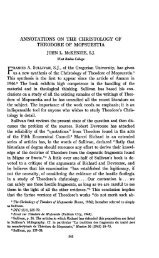SYMBOL, MYTH, AND THE BIBLICAL REVELATION AVERY ...
SYMBOL, MYTH, AND THE BIBLICAL REVELATION AVERY ...
SYMBOL, MYTH, AND THE BIBLICAL REVELATION AVERY ...
Create successful ePaper yourself
Turn your PDF publications into a flip-book with our unique Google optimized e-Paper software.
<strong>SYMBOL</strong>, <strong>MYTH</strong>, <strong>AND</strong> <strong>THE</strong> <strong>BIBLICAL</strong> <strong>REVELATION</strong> 17<br />
of the sexual intercourse between the sons of God and the daughters of<br />
men (Gn 6:4 ff.), the myths seem to have been only lightly retouched<br />
and to remain, as Childs points out, in partial tension with the fundamental<br />
faith of Israel. 37<br />
In the later portions of the Old Testament the mythological elements<br />
are subjected to stricter control. The prophets use mythological themes<br />
with considerable detachment and deliberation to suggest the quality<br />
of events which had not been revealed to them in detail. Especially is<br />
this true of the accounts of the creation and final consummation.<br />
Dodd gives a good explanation:<br />
These first and last things can be spoken of only in symbols. They lie, obviously,<br />
outside the order of time and space to which all factual statements refer. They are<br />
not events (as the historian knows events), but realities of a suprahistorical order.<br />
In referring to them the Biblical writers make free use of mythology. 38<br />
The entire process, which leads from the earliest traditions of<br />
Genesis to the latest contributions of the postexilic prophets, may be<br />
characterized as a continual process of demythologizing. 39 The primitive<br />
pagan myths, which gave concrete expression to man's longing for<br />
divine deliverance from the hostile powers, are gradually answered by<br />
divine revelation. As the answer is heard and assimilated, the myths<br />
are progressively purified, broken, and sublimated. But for the fulness<br />
of the answer, we must look beyond the Old Testament.<br />
<strong>MYTH</strong> IN <strong>THE</strong> NEW TESTAMENT<br />
The question of myth in the New Testament has been the subject<br />
of lively controversy in recent years and requires some special treatment,<br />
even in so brief a survey as we are attempting. The New Testament<br />
itself uses the term "myth" in a definitely pejorative sense. On<br />
four occasions in the Pauline pastoral epistles, mythos is denounced as<br />
contrary to revealed truth and sound doctrine. 40 2 Peter, moreover,<br />
vehemently declares that the Christian faith is founded on solidly<br />
37 Op. cit., chap. 3.<br />
38 C. H. Dodd, The Bible Today (paperback ed.; Cambridge, Eng., 1961) p. 112. O.<br />
Cullmann, who likewise labels the biblical descriptions of the prehistory and posthistory<br />
as myth, draws a very sharp opposition between myth and history; cf. Christ and Time<br />
(Philadelphia, 1950) pp. 94-96.<br />
39 H. Cazelles, art. cit., col. 260-61.<br />
40 1 Tim 1:4; 4:6 f.; 2 Tim 4:3 f.; Tit 1:14. The two references to myth in the OT "deuterocanonicals"<br />
are no more complimentary: Sir 20:19, Bar 3:23.
















